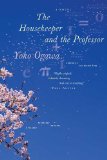Summary | Excerpt | Reading Guide | Reviews | Beyond the Book | Read-Alikes | Genres & Themes | Author Bio

A Novel
by Yoko OgawaThis article relates to The Housekeeper and the Professor
The Story Behind the Book
Hakase no aishi ta
sushiki was
originally published in
Japan in 2003, selling
more than 2.5 million
copies and garnering the
prestigious Yomiuri
Prize. The title is more
literally translated as
The Professor and His
Beloved Equation,
and is often referred to
as such prior to the
American publication of
The Housekeeper and
the Professor. Yoko
Ogawa has published more
than 20 works of fiction
and nonfiction, many
translated into French,
German, and other
languages, but The
Housekeeper and the
Professor is her
first full-length novel
to be translated into
English. The translator,
Stephen Snyder, has also
translated Ogawa's
collection of three
novellas, entitled
The Diving Pool,
published by Picador in
2008, and a short story,
The Cafeteria in the
Evening and a Pool in
the Rain, for
The New Yorker
(September, 2004).
Hakase no aishi ta
sushiki was made
into a successful
Japanese
film in 2006,
garnering many awards,
including Best Feature
at the 2007 Syracuse
International Film
Festival. While the
novel is narrated by the
Housekeeper, the film is
told from the point of
view of the adult math
professor Root, as he
recounts the story of
his childhood to his
students.
Paul Erdos
(1913-1996)
A biography of the
Hungarian mathematician
Paul Erdos (The Man
Who Loved Only Numbers,
by Paul Hoffman) is
cited as a source in the
bibliography of
Hakase no aishi ta
sushiki, and it's
easy to see how Ogawa's
Professor might have
been inspired by Erdos's
notoriously eccentric
personality.
Erdos was singularly
focused, lived on coffee
and often amphetamines,
and did little else
besides think about
math, yet he was also
known for a quirky sense
of humor and joie de
vivre. Although he won
cash prizes for his
work, he frequently gave
the money away to other
mathematicians. Paul
Hoffman describes Erdos
as a "mathematical
monk", whose belongings
could fit in two
suitcases. He never
married, and had no
children.
Ogawa gave many of these
ascetic characteristics
to the Professor. He
also worked on difficult
math problems, entering
many contests and
winning large sums of
money, leaving prize
checks uncashed and
crumpled up in a box in
the closet. Erdos was
called "uncouth and
unconventional" during
his fellowship at
Princeton, and was
described by friends as
"a nervous and agitated
person," all
descriptions befitting
Ogawa's Professor.
Erdos was known more for
solving problems than
developing theories, and
he published nearly 1500
papers during his
lifetime, working with
over 500 collaborators.
This unparalleled
collaboration gave rise
to the
Erdos Number, a kind
of degrees-of-separation
rating well-known among
mathematicians. As in
the game
Six Degrees of Kevin
Bacon, the lower a
person's Erdos number,
the closer he or she is
to Erdos.
![]() This article relates to The Housekeeper and the Professor.
It first ran in the February 5, 2009
issue of BookBrowse Recommends.
This article relates to The Housekeeper and the Professor.
It first ran in the February 5, 2009
issue of BookBrowse Recommends.
Your guide toexceptional books
BookBrowse seeks out and recommends the best in contemporary fiction and nonfiction—books that not only engage and entertain but also deepen our understanding of ourselves and the world around us.